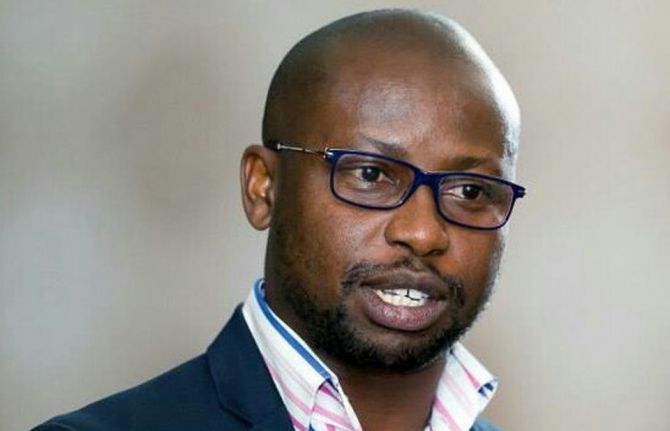

Update
African men fighting stigma and discrimination
16 May 2017
16 May 2017 16 May 2017In the lead-up to IDAHOT (the International Day against Homophobia, Transphobia and Biphobia) 2017, UNAIDS spoke with Kene Esom, the Executive Director of AMSHeR. AMSHeR promotes non-discrimination, particularly discrimination based on sexual orientation and gender identity, and advocates for access to quality health services for lesbian, gay, bisexual and transgender people in Africa.
Question: Tell us about the changes across the African continent since AMSHeR started nine years ago
AMSHeR was established to address discrimination and human rights violations based on sexual orientation and gender identity, the disproportionate vulnerability to HIV of men who have sex with men and the policy and social barriers that hinder access to services for lesbian, gay, bisexual and transgender (LGBT) people in Africa.
African LGBT people are bringing the issues of sexual orientation, gender identity and human rights into regional and global policy and legal spaces and are making the African LGBT experience the basis of policy, service delivery and funding decisions on Africa.
Never before has there been more visibility and interest in LGBT issues and understanding of the experience and needs of African LGBT people and effective representation of African LGBT communities in the global discourse. This is largely because of AMSHeR’s courageous mandate to make African LGBT people the faces and voices of inclusion in Africa and by so doing put LGBT inclusion on the agenda of African states and policy-makers as well as human rights and social justice movements.
Question: What made you focus your recent campaign on engaging with faith leaders?
It is widely accepted that religion and religious leaders have a great influence on political leaders and in African society. The widespread intolerance, discrimination and violence against people based on their real or perceived sexual orientation, gender identity and expression, and lack of access to health services, may be attributed to a highly religious environment that has normalized heterosexuality and patriarchy while demonizing sexual diversity.
Religion-inspired discrimination is very rife, particularly in Africa. The experiences of African LGBT people have been varied, from torture and inhumane treatment in the form of exorcism and conversion therapy, to mob violence incited by religious leaders from the pulpits, to the experiences of religious leaders sitting on national health agencies blocking attempts to provide health and rights services to LGBT people, to religious leaders actively sponsoring discriminatory legislation.
Religious leaders, because of their respected positions in society, are critical in addressing issues of stigma and discrimination as well as upholding the rights of all people regardless of sexual orientation, and, even more importantly, have emerged as strategically placed in discourses on HIV, sexuality and spirituality.
AMSHeR appreciates the role that religious leaders play, but at times they perpetuate discrimination based on sexual orientation and gender identity, and that is why, since 2015, under our Integrating Spirituality and Sexuality project, we have been working with religious leaders and LGBT people of faith to address these issues.
We have partnered with leaders of faith-based communities to initiate dialogue between institutions and LGBT communities in order to find common ground to integrate spirituality and sexuality. This has been done following lessons learned on how faith-based organizations have been integral in advocating for non-discrimination and stigma against people living with HIV. Faith-based organizations have proved to be allies to many civil society organizations in pushing for non-discrimination and stigma against people living with HIV.
As part of its work, AMSHeR has released a documentary, Queer Voices of Faith, for IDAHOT 2017.
Question: You are a Nigerian working in South Africa for a pan-African organization. What motivates you?
Whether in Nigeria, South Africa, Mozambique or Morocco, I am amazed at the remarkable kindred spirit that connects African societies. I consider myself a pan-Africanist, I believe there is more that connects us than otherwise, despite our diversities, and I celebrate Africa’s diversity and the values that unite us.
AMSHeR has been a perfect vehicle to express my pan-African ideals and promote the quest for social justice across Africa.
Question: What do you see as the future on the continent for LGBT people?
The future of LGBT people in Africa is to strengthen the movement that is now under way in which LGBT people, their leaders and other advocates are steadily seeking to realize their fundamental human rights, including the rights to equality and non‐discrimination, the highest attainable standard of health, freedom of expression, freedom of association and assembly, freedom from unlawful arrest and detention and equal access to justice.
I see a future and it is a bright one. A lot has changed since 2009, when AMSHeR came into operation. We have taken and continue to take incremental steps towards achieving the full inclusion of African LGBT people as equal citizens of Africa. The tide is flowing in one direction and it is in the right direction.
Question: This year’s theme for IDAHOT is family. What does family mean to you?
Family is a bond of love as opposed to biology and all families, in whatever shape or form, should be afforded the same protection and recognition from a legal and ideological perspective. Africa is replete with different expressions of family and we celebrate the role that families play in shaping society. It is also imperative to acknowledge that it is through families that we can reframe respect for diversity and unlearn the prejudice that is at the root of the discrimination that LGBT people face today.
Related
 “Who will protect our young people?”
“Who will protect our young people?”

02 June 2025


